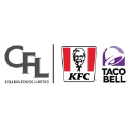🚀 Sign up Free for Public Company Valuation & Insights!
Sign up for free to get access to the best public company valuation and insights. Get started today and unlock the potential of your investments!
Sign Up
Collins Foods
Restaurant chains / Quick Service Restaurants
At a Glance | Core Facts | Company | Industry | Competitors | Stock Swings | News | Income | Balance | Cash Flow | Growth | Enterprise | Ratios | Metrics | Dividends | Risks | SWOT | Porter's Five Forces | PEST | Score Positive | Clusters | Reports | WebPolitical Factors:
1. Government regulations: The company operates in multiple countries, and thus, is subjected to various laws and regulations in each of these countries. These regulations include minimum wage laws, food safety regulations, taxation policies, and labor laws. Any changes or updates in these regulations can significantly impact the operations and profitability of the company.
2. Trade policies: Collins Foods imports a significant amount of its ingredients and supplies from different countries. Changes in trade policies, such as tariffs or restrictions on imports, can increase the cost of production and affect the company’s profitability.
3. Political stability: The company’s operations in different countries can be affected by political instability, civil unrest, or changes in government policies. These factors can disrupt the supply chain, cause changes in consumer behavior, and impact the company’s overall financial performance.
Economic Factors:
1. Economic conditions: The economic conditions, such as inflation, interest rates, and unemployment, can significantly affect the company’s business operations. For example, during a recession, consumers tend to cut down on their dining out expenses, which can affect the company’s sales and revenue.
2. Currency exchange rates: As a multinational company, Collins Foods is exposed to fluctuations in currency exchange rates. Changes in exchange rates can impact the cost of imported goods and services, and therefore, affect the company’s profitability.
3. Consumer spending: The purchasing power of consumers and their spending habits can impact the company’s sales and performance. A decline in consumer spending can result in a decrease in revenue for the company.
Social Factors:
1. Demographic shifts: Changes in the demographic profile of the target market, such as age, income, and lifestyle, can affect the demand for the company’s products. For example, an aging population may prefer healthier options, which can impact sales of fast food chains like KFC and Taco Bell, owned by Collins Foods.
2. Changing consumer preferences: Consumers are increasingly becoming health-conscious and demanding healthier food options. This trend can impact the sales of Collins Foods’ fast-food chains and the company’s overall profitability.
3. Food safety and health concerns: With the rise in awareness about food safety and health concerns, consumers are becoming more conscious about the quality of food they consume. Any health or safety-related issues can have a significant impact on the company’s brand image and sales.
Technological Factors:
1. Automation and digitalization: The food industry is rapidly adopting technology to streamline processes, reduce costs, and provide a better customer experience. Collins Foods needs to continuously invest in advanced technologies to remain competitive and improve operational efficiency.
2. Online ordering and delivery: With the increasing popularity of delivery and online ordering, the company needs to invest in technology to provide a seamless customer experience. Failure to do so can result in loss of sales and revenue.
3. Social media: Social media has become a crucial platform for companies to connect with their customers and promote their products. Collins Foods needs to utilize social media effectively to engage with its customers and create brand awareness.
Environmental Factors:
1. Sustainable sourcing: As consumers become more environmentally conscious, they prefer companies that adopt sustainable sourcing practices. The company needs to ensure that its suppliers adhere to ethical and sustainable practices to maintain its brand image and meet consumer expectations.
2. Packaging and waste management: The food industry is under increasing pressure to reduce packaging waste and adopt sustainable waste management practices. Collins Foods needs to ensure that its packaging is environmentally friendly and implement strategies to reduce its overall environmental footprint.
3. Climate change: The effects of climate change, such as extreme weather conditions, can impact the supply of ingredients and increase production costs. The company needs to have strategies in place to mitigate the impact of climate change on its operations.